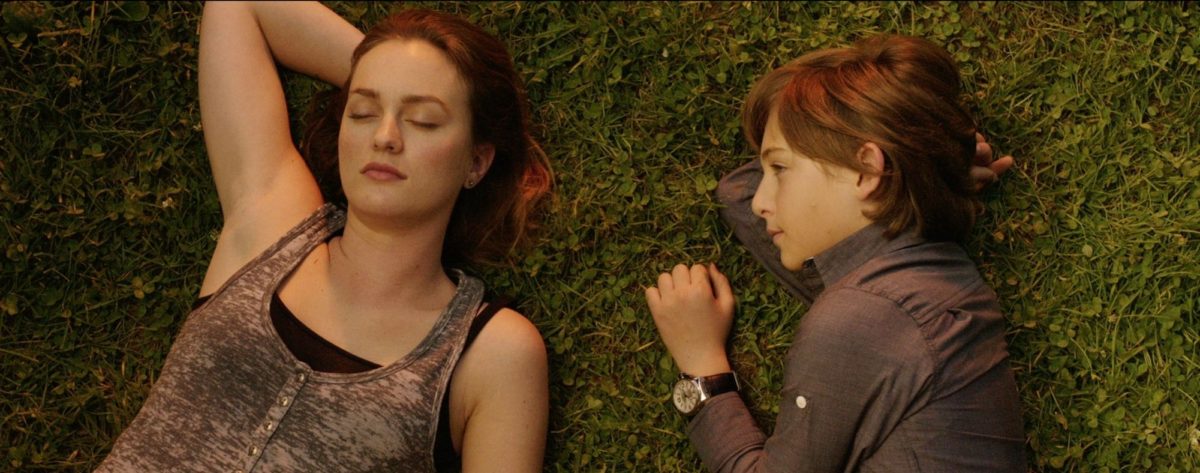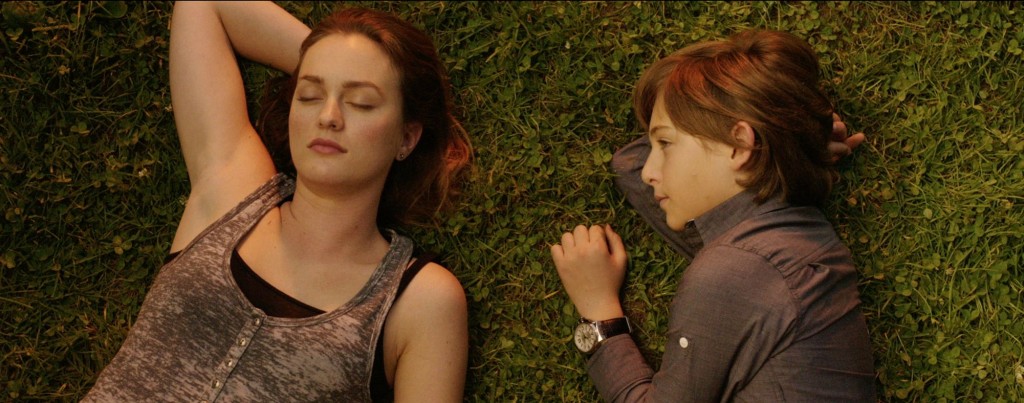This is one of those films which begins slowly, impersonally, almost predictably, but which by the end you just want to hug and refuse to let go. It’s a film, essentially, about loneliness, and the friendship which ensues between two unlikely people, in similar circumstances.
One of the finest images in the film comes right at the start. We see 12-year-old Reggie Kipper (wonderfully portrayed by Julian Shatkin) sitting in a white bath in lots of white foam in a white bathroom with his eyes closed, alone. With the film’s calm, melancholic score, he appears to reflect upon his own (still innocent) being, his very separateness from the rest of life. Reggie is a child prodigy too, and knows a lot of things.
The start of the film overcooks Reggie’s smart alec-ness a little, however. So he can do complex Maths without paying attention, recite eloquently a whole chunk of Keats, play the cello masterfully, and compose his own music (the title of the film). But he’s a kid too and lonely – he has one friend, who he kind of tolerates, but otherwise sits in a huge amazing house in Upstate New York reading and expanding his IQ. His Mom is overbearing and short-fused, while dad is elsewhere, or not at all. Then along comes Eleanor (Leighton Meester).
Eleanor, too, is not in the best place. Recently separated from wannabe musician boyfriend Dennis (real-life Green Day rocker Billie Joe Armstrong), and having lost her job, she finds herself homeless and penniless. Going back to the family is not an option. But fate intervenes. With barely any experience, Eleanor is soon living in Reggie’s elegant Upstate palace as his temporary nanny, or else as kind of earth-mother: because Eleanor brings Reggie in touch with real events (and proper grub like a good Chinese), and with his feelings. Reggie re-connects. He’s great at thinking but less great at living.
As the film continues, so the two characters spend more time together. The friendship grows but, at times, feels a tad claustrophobic, for Eleanor, and perhaps for us, the audience. Our young prodigy, however, starts to come-of-age and admire his nanny somewhat romantically. But these changes in nuance are done exquisitely, through moments, looks, pauses, and are utterly believable. And Eleanor, too, becomes grateful for fate’s intervention and takes solace in the friendship.
Both characters gain: Reggie gets his beautiful new nanny, but is freed also from the cloisters of privilege and gift. When Eleanor’s dad gets seriously ill, she takes Reggie with her to visit, and he meets her family. And here there is no vegetarian cuisine, only cheap commercial snacks and anything-on-the-TV. It’s a thoughtless, dirty, chaotic world, one of struggle and fatigue. But what about Eleanor? She receives ideas of finesse and artistry from the young Reggie, and ideas again of music and her own lost gift for the cornet. It’s a relationship of spiritual symbiosis.
The film, written and directed by Frank Whaley, is beautifully paced and as beautifully poised. More so, he connects not only his characters but also his audience with ideas of friendship, and of finesse and poverty too, and the eternal hope that the disparate twain shall (and do) meet. It’s arguable that the film, with its touching score, twangs the heartstrings a little too much, but this is only an argument and not entirely convincing. This is a film which uses intimation, and which glances at life sideways-on.
The plot, if you can call it that, is uncomplicated and the characters few. Dialogue is often sparse, much like Reggie’s home. In it, they sit in a grand dining area where we hear the clink of every designer spoon and fork. There are lonely echoes and spaces in the film, as in the house. Reggie plays cello in a large unused, unfinished pool, and yet he can’t swim. The acting is first-rate (especially from Julian Shatkin), the film is pitched just about right, and the cinematography is thoughtful both in its use of light and shade and use of perspective. As audience, we come to care for these characters and their friendship, and we genuinely wish them well. A knock-out in the quietest sense.
Like Sunday, Like Rain premiered at the Raindance Film Festival on 29/09/14.
Verdict ★★★★






























